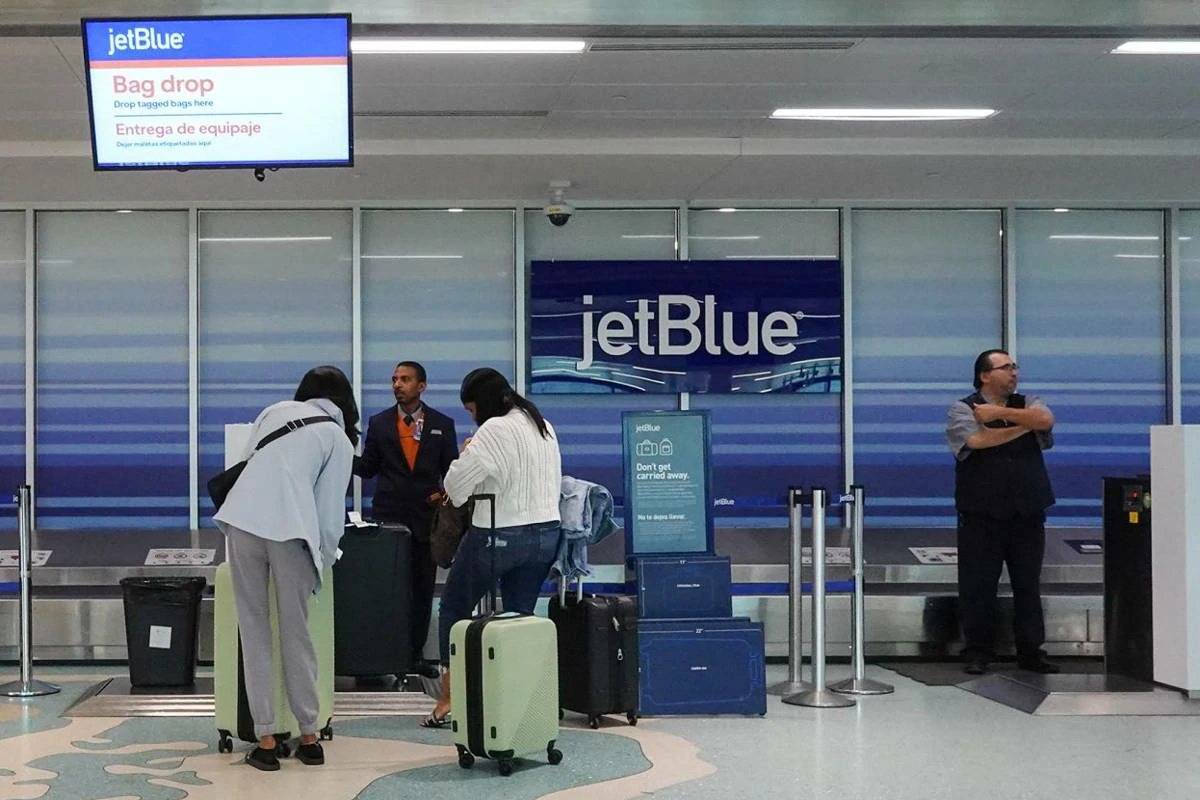Guide to JetBlue Baggage Fees? Answer is – JetBlue’s baggage fees vary depending on your fare type, destination, and when you pay the fee. Generally, Blue Basic fares do not include any checked bags, while Blue, Blue Extra, Blue Plus, and Mint fares include at least one checked bag. The fees for additional or overweight bags can vary. It’s always best to check JetBlue’s website for the most up-to-date and specific information regarding your flight.
Summary
- JetBlue’s baggage fees depend on the fare type, destination, and payment timing.
- Blue Basic fares don’t include checked bags, while other fares include at least one.
- Additional or overweight bag fees apply and vary based on several factors.
- JetBlue offers a baggage calculator on its website for accurate fee estimation.
- Various tips are available to avoid or minimize baggage fees on JetBlue.
Guide to JetBlue Baggage Fees?
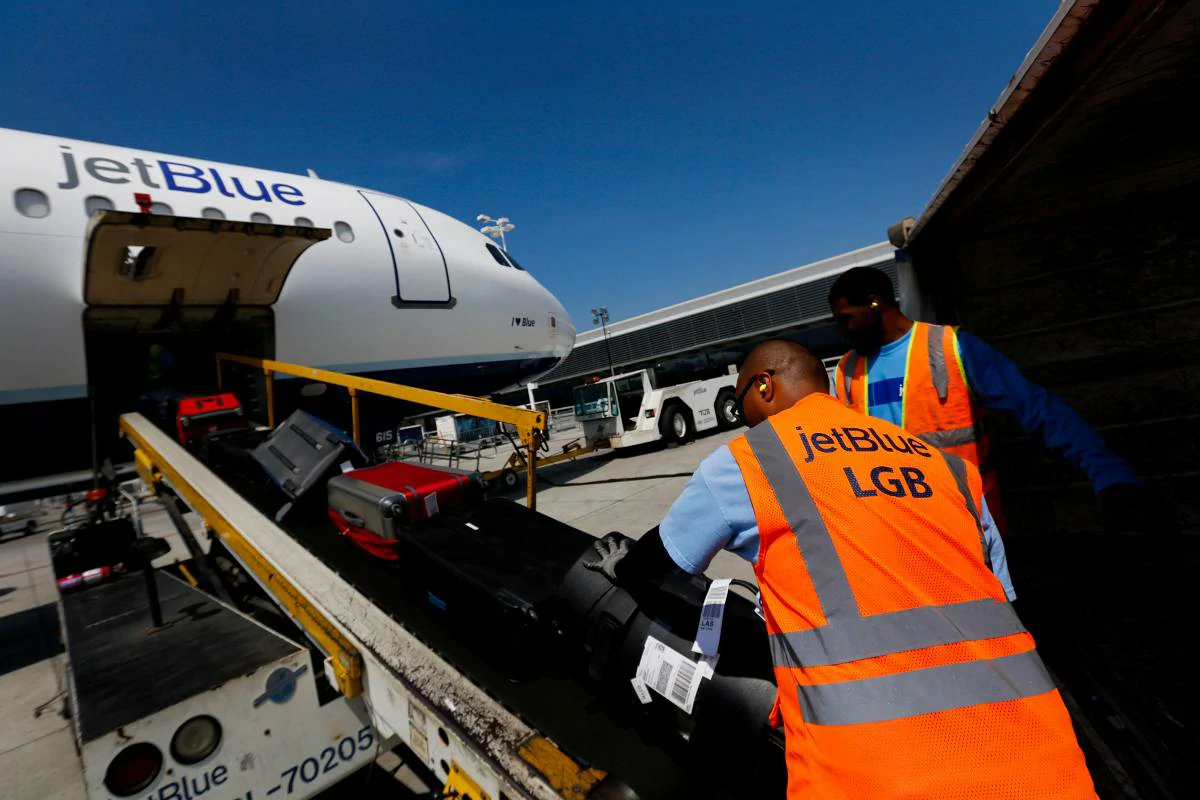
Navigating airline baggage fees can be a frustrating experience, especially with the ever-changing policies and varying costs across carriers. JetBlue Airways, known for its customer-centric approach, aims to make this process as transparent as possible.
However, understanding their baggage policy and associated fees is crucial to avoid unexpected expenses and ensure a smooth travel experience.
Understanding JetBlue’s Baggage Policy
JetBlue’s baggage policy, like most airlines, distinguishes between carry-on and checked baggage, each with its own set of rules and potential fees.
Carry-on Baggage: JetBlue permits one carry-on bag and one personal item free of charge for most fares. The carry-on bag should fit in the overhead bin and adhere to specific size and weight restrictions. The personal item, such as a purse, briefcase, or laptop bag, should fit under the seat in front of you.
Checked Baggage: The allowance for checked baggage varies depending on your fare type and destination. Blue Basic fares, the most economical option, do not include any free checked bags. However, other fares like Blue, Blue Extra, Blue Plus, and Mint do offer a certain number of complimentary checked bags.
Importance of Knowing Baggage Fees
Understanding JetBlue’s baggage fees is vital for several reasons:
Budgeting: Baggage fees can significantly impact your travel budget. Knowing the potential costs upfront allows you to factor them in and avoid surprises at the airport.
Packing: Awareness of the baggage policy helps you pack efficiently and avoid exceeding weight or size limits, which could lead to additional fees.
Decision Making: Understanding the different fare options and their associated baggage allowances can help you choose the most suitable fare for your needs and budget.
JetBlue’s baggage policy and fees are designed to be transparent and fair. However, they can be complex and vary depending on various factors. By familiarizing yourself with the policy, you can confidently plan your trip and avoid unexpected charges.
Emily Kaufman Expert Opinion
“Knowing the ins and outs of an airline’s baggage policy is essential for any traveler. It not only helps you avoid unexpected fees but also allows you to pack strategically and choose the right fare for your needs,” says Emily Kaufman, a travel expert and founder of The Travel Mom website.
JetBlue Fare Types and Baggage Allowances 2025

JetBlue offers a range of fare options, each with different baggage allowances, catering to various travel needs and budgets.
Within the U.S., the Caribbean, and Latin America
| Fare Type | Carry-On | 1st Checked Bag | 2nd Checked Bag | 3rd+ Checked Bag |
|---|---|---|---|---|
| Blue Basic | 1 Personal Item* | $45 | $65 | $180 |
| Blue | 1 Carry-On + 1 Personal Item | $45 | $65 | $180 |
| Blue Extra | 1 Carry-On + 1 Personal Item | Included | $65 | $180 |
| Blue Plus | 1 Carry-On + 1 Personal Item | Included | Included | $180 |
| Mint | 2 Carry-On + 1 Personal Item | Included | Included | Included |
| Mosaic | 1 Carry-On + 1 Personal Item | Included | Included | $180 |
| Mosaic+ | 1 Carry-On + 1 Personal Item | Included | Included | Included |
Between the U.S. and the U.K.
| Fare Type | Carry-On | 1st Checked Bag | 2nd Checked Bag | 3rd+ Checked Bag |
|---|---|---|---|---|
| Blue Basic | 1 Personal Item* | $75 | $105 | $205 |
| Blue | 1 Carry-On + 1 Personal Item | $75 | $105 | $205 |
| Blue Extra | 1 Carry-On + 1 Personal Item | Included | $105 | $205 |
| Blue Plus | 1 Carry-On + 1 Personal Item | Included | Included | $205 |
| Mint | 2 Carry-On + 1 Personal Item | Included | Included | Included |
| Mosaic | 1 Carry-On + 1 Personal Item | Included | Included | $205 |
| Mosaic+ | 1 Carry-On + 1 Personal Item | Included | Included | Included |
1. Blue Basic Fares
Blue Basic is JetBlue’s most economical fare option, designed for budget-conscious travelers who prioritize affordability. However, it comes with some restrictions, particularly regarding baggage.
- Carry-On: Passengers with Blue Basic fares are allowed one personal item that fits under the seat in front of them. This could be a purse, laptop bag, or small backpack.
- Checked Baggage: Blue Basic fares do not include any complimentary checked bags. Passengers who need to check a bag will be charged a fee, which varies depending on the destination and when the bag is added to the reservation.
- Additional Fees: It’s important to note that Blue Basic fares also have additional fees for seat assignments, changes, and cancellations.
2. Blue Fares
Blue fares offer a bit more flexibility than Blue Basic, including a free carry-on bag and the option to purchase checked baggage.
- Carry-On: Passengers with Blue fares are allowed one carry-on bag that fits in the overhead bin and one personal item.
- Checked Baggage: Blue fares do not include free checked bags, but passengers can purchase them for a fee.
- Other Benefits: Blue fares offer more flexibility than Blue Basic, with lower change and cancellation fees.
3. Blue Extra Fares
Blue Extra fares provide even more benefits, including a free checked bag and additional perks like early boarding and more TrueBlue points.
- Carry-On: Passengers with Blue Extra fares are allowed one carry-on bag and one personal item.
- Checked Baggage: Blue Extra fares include one free checked bag.
- Other Benefits: Blue Extra fares offer several additional benefits, including early boarding, more TrueBlue points, and even more flexibility with changes and cancellations.
4. Blue Plus Fares
Blue Plus fares offer the most benefits for non-elite members, including more free checked bags and even more TrueBlue points.
- Carry-On: Passengers with Blue Plus fares are allowed one carry-on bag and one personal item.
- Checked Baggage: Blue Plus fares include two free checked bags.
- Other Benefits: Blue Plus fares offer all the benefits of Blue Extra, plus even more TrueBlue points and the ability to earn Mosaic Qualifying Points faster.
5. Mint Fares
Mint is JetBlue’s premium travel experience, offering a luxurious and comfortable journey with numerous perks, including generous baggage allowances.
- Carry-On: Mint passengers are allowed two carry-on bags and one personal item.
- Checked Baggage: Mint fares include two free checked bags.
- Other Benefits: Mint fares offer a host of additional benefits, including lie-flat seats, priority check-in, expedited security, and access to exclusive lounges.
6. Mosaic Elite Status Members
JetBlue’s Mosaic program rewards frequent flyers with various benefits, including additional baggage allowances.
- Carry-On: Mosaic members are allowed one carry-on bag and one personal item.
- Checked Baggage: Mosaic members receive additional free checked bags depending on their status level.1. Mosaic: 2 free checked bags
2. Mosaic+: 3 free checked bags
Scott Keyes Expert Opinion
Scott Keyes, founder of Scott’s Cheap Flights, emphasizes the importance of choosing the right fare type based on your baggage needs: “If you’re a light packer, Blue Basic might be the most cost-effective option. But if you need to check bags, consider upgrading to a fare that includes them to avoid extra fees.”
Standard Checked Baggage Fees
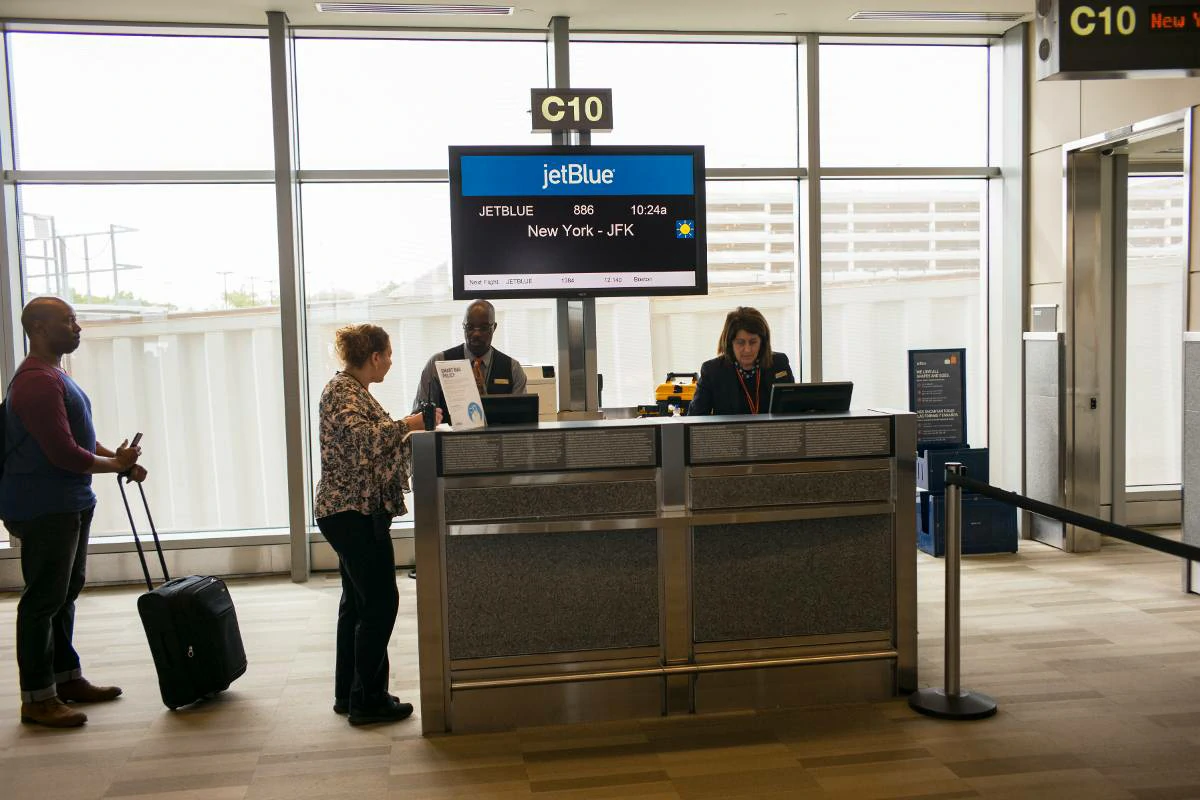
JetBlue’s checked baggage fees are structured to provide flexibility while maintaining affordability.
However, they can vary depending on the fare type, destination, and timing of payment. Here’s a breakdown of the standard checked baggage fees:
1. First Checked Bag
- Blue Basic: $45 (within the U.S., Caribbean, and Latin America), $75 (between the U.S. and the U.K.)
- Blue: $45 (within the U.S., Caribbean, and Latin America), $75 (between the U.S. and the U.K.)
- Blue Extra, Blue Plus, Mint, Mosaic, Mosaic+: Included
For Blue Basic and Blue fares, the first checked bag fee is relatively standard across destinations. However, it’s important to note that this fee increases for transatlantic flights between the U.S. and the U.K.
2. Second Checked Bag
- Blue Basic: $65 (within the U.S., Caribbean, and Latin America), $105 (between the U.S. and the U.K.)
- Blue: $65 (within the U.S., Caribbean, and Latin America), $105 (between the U.S. and the U.K.)
- Blue Extra: $65 (within the U.S., Caribbean, and Latin America), $105 (between the U.S. and the U.K.)
- Blue Plus, Mint, Mosaic, Mosaic+: Included
The second checked bag fee is generally higher than the first bag fee, regardless of fare type or destination.
3. Additional Checked Bags
- All Fare Types: $180 (within the U.S., Caribbean, and Latin America), $205 (between the U.S. and the U.K.)
JetBlue charges a flat fee for each additional checked bag beyond the second bag. This fee is significantly higher than the first and second bag fees, encouraging travelers to pack efficiently.
4. Carry-On Baggage Fees (Blue Basic)
- Blue Basic: $65 (1st or 2nd checked bag), $180 (3rd checked bag)
While Blue Basic fares allow for a personal item, any carry-on bag brought to the gate will incur a fee. This fee is equivalent to the first or second checked bag fee, depending on how many bags the passenger has already checked.
Sarah Schlichter Expert Tip
Sarah Schlichter, a senior editor at SmarterTravel, advises, “If you’re flying Blue Basic and know you’ll need a carry-on bag, consider checking it in at the ticket counter. You’ll pay the same fee, but you won’t have to worry about finding space in the overhead bins.”
Overweight and Oversized Baggage Fees
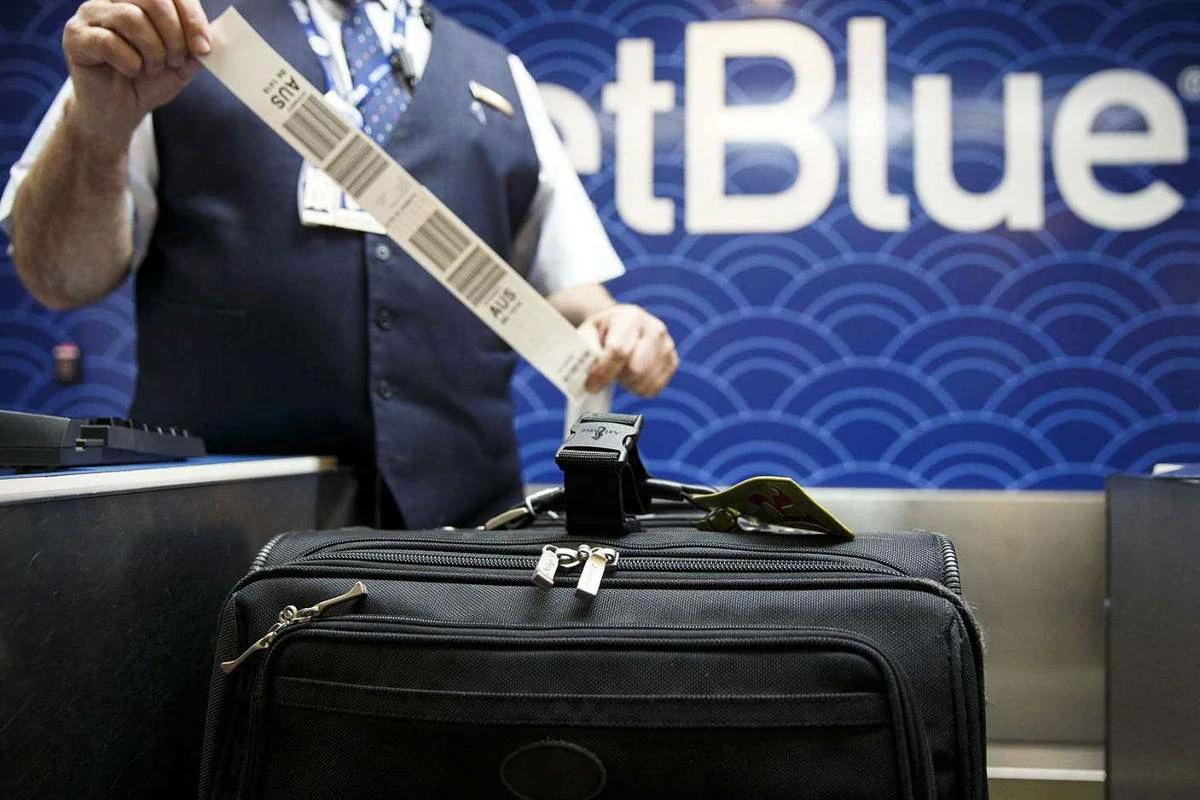
JetBlue, like all airlines, has specific weight and size restrictions for checked baggage to ensure the safety and efficiency of their operations. Exceeding these limits can lead to additional fees, so it’s important to be aware of them before you pack.
1. Weight Limits
The standard weight limit for checked bags on JetBlue is 50 pounds (22.68 kg). However, this can vary depending on the fare type and destination:
- Most fares (within the U.S., Caribbean, and Latin America): 50 pounds (22.68 kg)
- Mint fares: 70 pounds (31.75 kg)
- Flights to/from the Dominican Republic, Haiti, or Port of Spain: 50 pounds (22.68 kg)
- Flights to/from Lima, Peru: 70 pounds (31.75 kg)
2. Overweight Baggage Fees
If your checked bag exceeds the weight limit, you’ll be charged an overweight baggage fee. The fee amount depends on how much the bag exceeds the limit:
- 51-99 pounds (23.13-44.91 kg): $150 per bag
- 100+ pounds (45.36+ kg): Not accepted
It’s crucial to note that bags exceeding 70 pounds (31.75 kg) are not allowed on flights to/from Lima, Peru. Additionally, no bags over 99 pounds (44.91 kg) are accepted on any JetBlue flight.
3. Size Limits
The standard size limit for checked bags on JetBlue is 62 inches (157.48 cm) in overall dimensions (length + width + height).
4. Oversized Baggage Fees
If your checked bag exceeds the size limit, you’ll be charged an oversized baggage fee:
- 63-80 inches (160.02-203.2 cm): $150 per bag
- 80+ inches (203.2+ cm): Not accepted
Johnny Jet Expert Tip
Johnny Jet, a seasoned traveler and travel influencer, recommends using a luggage scale to weigh your bags before heading to the airport. “This simple step can save you from unexpected overweight baggage fees and the hassle of rearranging your belongings at the last minute,” he says.
Sports Equipment Fees

JetBlue understands the passion for sports and adventure, and they strive to accommodate passengers traveling with sports equipment. However, due to the unique nature and size of these items, specific fees and regulations apply.
1. Standard Sports Equipment Fees
JetBlue considers most standard sports equipment as one checked bag, meaning the fees will align with their standard checked baggage charges. The specific fee depends on your fare type, destination, and whether it’s your first or second checked bag.
For instance, if you’re flying Blue Basic within the U.S. and it’s your first checked bag (which in this case is your sports equipment), the fee would be $45. However, if you were flying Mint, the first checked bag is included in the fare, so your sports equipment would fly for free.
It’s important to note that JetBlue categorizes a wide range of items as standard sports equipment, including:
- Golf bags
- Skis and snowboards
- Surfboards and paddleboards
- Scuba gear
- Bicycles (some assembly/disassembly may be required)
- Fishing rods
2. Overweight/Oversized Sports Equipment Fees
While JetBlue generally waives oversized baggage fees for sports equipment, they still enforce the standard weight restrictions. If your sports equipment exceeds the weight limit for your fare type (typically 50 pounds for most fares, 70 pounds for Mint), you’ll be subject to the overweight baggage fees outlined in section 4.2 of this guide.
These fees can range from $150 to $205 depending on the weight and whether you’re flying domestically or internationally. It’s crucial to weigh your sports equipment accurately before arriving at the airport to avoid unexpected charges.
Brian Kelly Expert Tip
Brian Kelly, founder of The Points Guy, suggests, “If you’re a frequent traveler with sports equipment, consider investing in a lightweight travel bag designed for your specific gear. It can help you stay within the weight limit and avoid unnecessary fees.”
Special Baggage Items
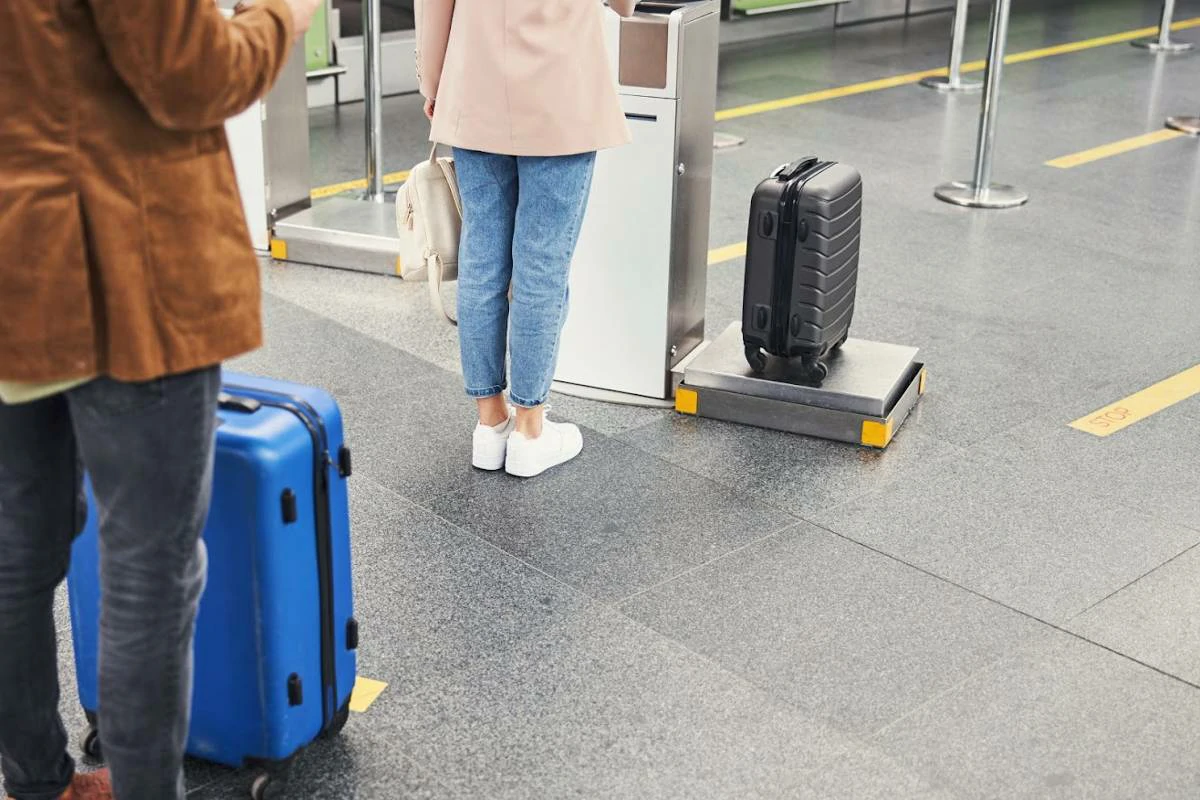
JetBlue understands that travel often involves more than just clothes and toiletries. That’s why they have specific guidelines and fees for special baggage items like musical instruments, medical equipment, and pet carriers.
1. Musical Instruments
For musicians traveling with their beloved instruments, JetBlue offers several options. Smaller instruments that fit within the carry-on size restrictions can be brought onboard as a carry-on item for most fare types (except Blue Basic).
Larger instruments that don’t fit in the overhead bin can be checked as baggage, subject to standard checked baggage fees.
Alternatively, musicians can purchase an extra seat for their instrument, which must weigh less than 165 pounds and be appropriately packed in a hard-sided case.
Natalie Smith Expert Tip
Natalie Smith, a professional violinist and frequent flyer, recommends, “Always call JetBlue in advance to discuss your specific instrument and travel plans. They can advise you on the best way to transport it and ensure a smooth check-in process.”
2. Medical Equipment
JetBlue allows passengers to travel with necessary medical equipment, such as CPAP machines, crutches, and wheelchairs, free of charge in addition to their standard baggage allowance.
However, it’s essential to notify JetBlue in advance, especially for larger or more complex equipment, to ensure proper handling and storage.
3. Pet Carriers
JetBlue welcomes small dogs and cats in the cabin as part of their JetPaws program. The pet and carrier must fit under the seat in front of you and adhere to specific size and weight restrictions. The fee for bringing a pet in the cabin is $125 each way.
Dr. Katy Nelson Expert Opinion
Dr. Katy Nelson, a veterinarian and host of “The Pet Show with Dr. Katy,” advises, “Before flying with your pet, ensure they are healthy, up-to-date on vaccinations, and comfortable in their carrier. Consider a trial run in the carrier at home to help them acclimate.”
Prepaying for Baggage

Planning ahead and prepaying for your checked baggage with JetBlue can offer both convenience and potential savings. The airline provides two main options for prepayment: online and at the airport.
1. Online Prepayment
Online prepayment is the most convenient and often cost-effective way to pay for your checked bags. You can do this during the booking process or anytime before you check in for your flight by visiting the “Manage Trips” section on JetBlue’s website.
Benefits
- Savings: Prepaying online typically offers a $5 discount per bag compared to paying at the airport. This can add up to significant savings, especially if you’re checking multiple bags or traveling with a group.
- Convenience: You can easily add bags to your reservation and pay for them from the comfort of your home or office. This saves you time and hassle at the airport.
- Peace of Mind: Knowing your baggage fees are taken care of in advance gives you peace of mind and allows you to focus on other aspects of your trip.
2. Airport Prepayment
If you didn’t prepay online, you can still pay for your checked bags at the airport. However, the fees will be slightly higher than the online rates. You can pay at the ticket counter or at a self-service kiosk.
Drawbacks
- Higher Fees: Airport prepayment fees are typically $5 more per bag than online prepayment fees.
- Longer Lines: You may encounter longer lines at the ticket counter or kiosk, especially during peak travel times.
To avoid the higher fees and potential delays, it’s always recommended to prepay for your bags online whenever possible.
Tracy Stewart Expert Opinion
Tracy Stewart, a travel writer and founder of The Traveling Teacher blog, shares her experience, “I always prepay for my bags online with JetBlue. It’s a simple way to save a few bucks and avoid the stress of dealing with it at the airport.”
Avoiding and Minimizing Baggage Fees

While JetBlue’s baggage fees are relatively transparent, there are still several strategies you can employ to avoid or minimize these additional costs.
1. Travel Light
The most straightforward way to avoid checked baggage fees is to pack light and only bring a carry-on bag. JetBlue allows one carry-on bag and one personal item for free with most fares (excluding Blue Basic).
By packing strategically and utilizing packing cubes or compression bags, you can fit a surprising amount into a carry-on.
Remember to check JetBlue’s carry-on size and weight restrictions to ensure your bag complies with their policy.
Marie Kondo Expert Tip
Packing Pro Tip: “Rolling your clothes instead of folding them can save space in your carry-on,” says Marie Kondo, a renowned organizing consultant and author of “The Life-Changing Magic of Tidying Up.”
2. Credit Card Benefits
Certain credit cards, particularly those co-branded with JetBlue, offer perks like a free checked bag on JetBlue flights.
For example, the JetBlue Plus Card and JetBlue Business Card waive the fee for your first checked bag when you book your flight with the card. This benefit extends to three additional companions on the same reservation.
3. Mosaic Elite Status
JetBlue’s TrueBlue Mosaic program offers frequent flyers elite status with various benefits, including waived baggage fees.
Mosaic members receive two free checked bags, while Mosaic+ members get three. To achieve Mosaic status, you need to earn 15,000 TrueBlue points or fly 30 segments plus 12,000 points within a calendar year.
Summer Hull Expert Opinion
“For frequent JetBlue flyers, attaining Mosaic status can be a game-changer. The waived baggage fees alone can offset the annual fee for the JetBlue Plus Card,” says Summer Hull, founder of Mommy Points, a family travel blog.
4. Military Personnel Benefits
JetBlue offers active duty military personnel traveling on official orders up to five free checked bags. To qualify for this benefit, you’ll need to present your military ID at check-in.
By taking advantage of these strategies and benefits, you can significantly reduce or even eliminate your baggage fees on JetBlue flights.
JetBlue Baggage Calculator

To help passengers estimate their baggage fees accurately and avoid surprises, JetBlue offers a handy Baggage Calculator on their website.
This tool allows you to input your specific flight details and baggage information to receive an instant estimate of the fees you may incur.
1. How to Use the Calculator
The JetBlue Baggage Calculator is simple to use and can be found on the airline’s website under the “Bag Information” section. Here’s a step-by-step guide:
- Select Your Origin and Destination: Choose the airports you’ll be flying from and to.
- Choose Your Fare Type: Select the fare type you’ve purchased (e.g., Blue Basic, Blue, Blue Extra, etc.).
- Enter Number of Bags: Specify the number of checked bags you plan to bring.
- Input Baggage Details: For each bag, enter its weight and dimensions (length, width, and height).
- Calculate Fees: Click the “Calculate” button, and the calculator will instantly display the estimated baggage fees based on your inputs.
By using the calculator, you can easily see how different fare types and baggage quantities affect the overall cost.
This allows you to make informed decisions about your baggage and potentially choose a fare that includes your desired baggage allowance.
2. Estimating Baggage Fees Accurately
The Baggage Calculator is a valuable tool for estimating your baggage fees, but it’s important to use it correctly to ensure accuracy:
- Accurate Information: Enter the correct information for your flight and baggage details. Double-check the weight and dimensions of your bags before inputting them into the calculator.
- Additional Fees: Remember that the calculator only estimates standard baggage fees. It may not include additional fees for overweight or oversized bags, sports equipment, or special items. Be sure to review JetBlue’s baggage policy for these specific fees.
- Prepayment Discount: If you plan to prepay for your bags online, you may be eligible for a discount. The calculator will indicate the potential savings.
By following these tips, you can confidently use the JetBlue Baggage Calculator to estimate your baggage fees accurately and plan your trip accordingly.
Brett Snyder Expert Opinion
Brett Snyder, president of Cranky Concierge air travel assistance and author of the Cranky Flier blog, advises, “Always use the airline’s baggage calculator before you fly. It’s a great way to avoid surprises and budget for your trip accurately.”
Comparison with Other Airlines
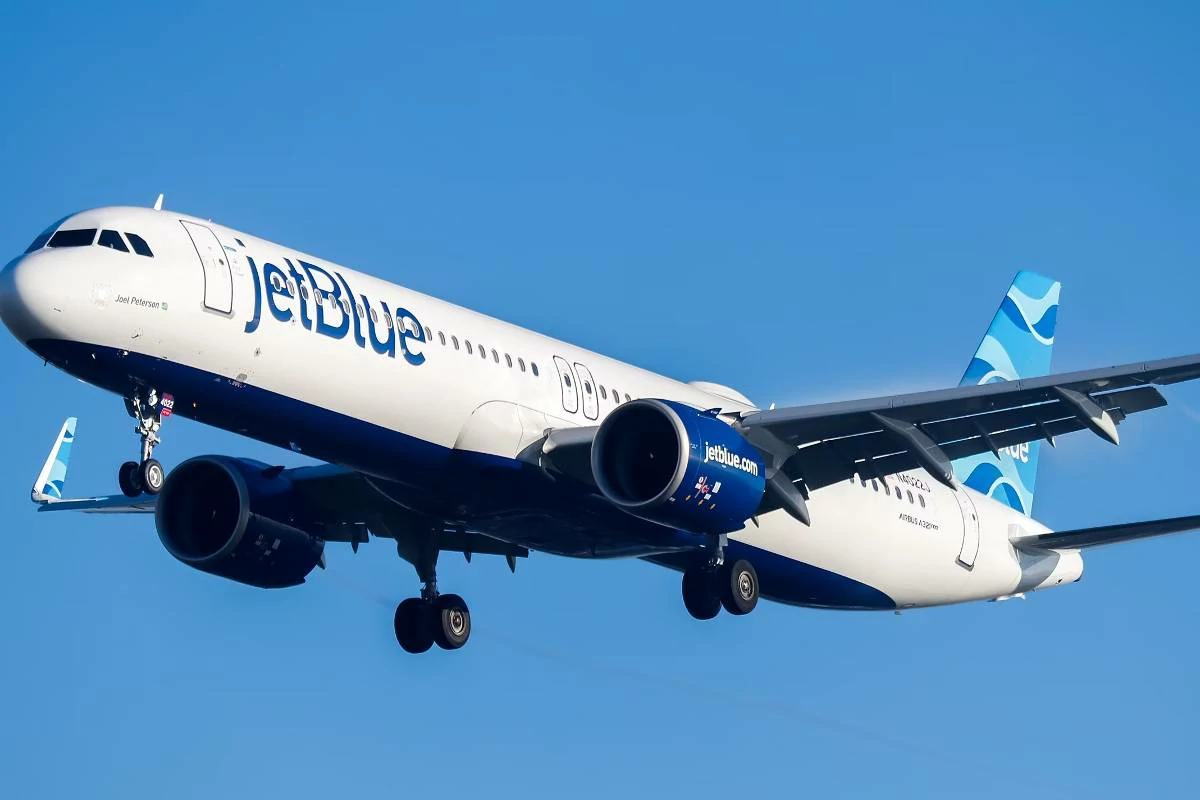
In the competitive landscape of air travel, understanding how JetBlue’s baggage fees stack up against other U.S. airlines is crucial for making informed decisions.
1. Average Baggage Fees Across U.S. Airlines
Baggage fees can vary significantly among U.S. airlines, depending on the route, fare class, and even the timing of payment. However, a 2023 study by CheapAir.com revealed some average fees for the first checked bag:
- Major Airlines (Delta, United, American): $30-$35
- Low-Cost Carriers (Spirit, Frontier, Allegiant): $35-$55
While JetBlue’s fees generally fall within this range, it’s important to note that their fee structure is more transparent and less variable compared to some other airlines, particularly low-cost carriers that often have additional fees for carry-on bags and other services.
2. JetBlue’s Competitiveness
While JetBlue may not always offer the absolute lowest baggage fees, they remain competitive in several ways:
- Transparency: Their fee structure is straightforward and easy to understand, with fewer hidden or surprise fees compared to some other airlines.
- Value-Added Fares: Higher fare classes like Blue Extra, Blue Plus, and Mint include checked bags, offering good value for those who typically check luggage.
- Generous Carry-On Allowance: JetBlue allows one carry-on bag and one personal item for free with most fares, which can be a significant advantage for light packers.
- Mosaic Benefits: Their frequent flyer program, TrueBlue Mosaic, offers additional baggage allowances and other perks, making it a valuable option for loyal customers.
Henry Harteveldt Expert Opinion
Henry Harteveldt, travel industry analyst and president of Atmosphere Research Group, notes, “JetBlue’s baggage fees are competitive with other airlines, and their focus on transparency and customer service sets them apart in the industry.”
Check-In Times for Checked Luggage
JetBlue provides various options for checking in your luggage, each with specific deadlines to ensure smooth handling and timely loading onto your flight. Adhering to these deadlines is crucial to avoid missing your flight or incurring additional fees.
1. Airport Check-In
If you prefer the traditional method of checking in at the airport counter, be sure to arrive with ample time to spare.
JetBlue recommends checking in your bags at least 40 minutes before your scheduled departure for domestic flights.
However, certain airports have earlier cut-off times, such as:
Fort Lauderdale (FLL), New York (JFK), and Tampa (TPA): 60 minutes before departure
For international flights, the check-in deadline is typically 60 minutes before departure, regardless of the airport.
2. Curbside Check-In
JetBlue offers curbside check-in at select airports for added convenience. This option allows you to check your bags without entering the terminal, saving you time.
However, the cut-off times for curbside check-in are the same as airport check-in:
- Domestic flights: 40 minutes before departure (60 minutes for FLL, JFK, and TPA)
- International flights: 60 minutes before departure
3. Online Check-In
Online check-in is the most convenient and efficient way to check in for your JetBlue flight.
You can check in online starting 24 hours before your flight and up to 90 minutes before departure for domestic flights and 120 minutes before departure for international flights.
While online check-in doesn’t directly involve checking your bags, it does streamline the process at the airport.
After checking in online, you can simply drop off your bags at the designated bag drop area, bypassing the check-in lines.
Matthew Kepnes Expert Opinion
Matthew Kepnes, author of “How to Travel the World on $50 a Day” and founder of Nomadic Matt, advises, “Always check in online as early as possible. It not only saves time at the airport but also gives you a better chance of getting your preferred seat.”
Conclusion
Navigating JetBlue’s baggage fees doesn’t have to be a daunting task. By understanding the nuances of their fare types, baggage allowances, and potential fees, you can make informed decisions and pack strategically to optimize your travel experience.
Remember, the key takeaways are:
- Fare Type Matters: Your fare type significantly impacts your baggage allowance. Blue Basic offers the least, while Mint and Mosaic Elite Status provide the most generous allowances.
- Know the Limits: Be aware of the weight and size restrictions to avoid overweight or oversized baggage fees.
- Prepay and Save: Utilize JetBlue’s online prepayment option to save on baggage fees.
- Utilize Benefits: Leverage credit card perks, Mosaic status, or military benefits to minimize or eliminate fees.
- Pack Light: Whenever possible, pack light and try to fit everything into your carry-on to avoid checked baggage fees altogether.
- Calculate in Advance: Use JetBlue’s Baggage Calculator to estimate your fees before arriving at the airport.
By following these tips and staying informed about JetBlue’s policies, you can confidently embark on your next journey without any baggage fee surprises.
FAQs
What if my bag is slightly overweight or oversized?
JetBlue strictly enforces their weight and size restrictions. Even a slight excess will incur the applicable fee.
Can I pool my baggage allowance with another passenger?
No, each passenger is responsible for their own baggage and associated fees.
Do children get a baggage allowance?
Yes, children over the age of two receive the same baggage allowance as adults. Lap infants do not have a baggage allowance.
What happens if my bag is lost or delayed?
JetBlue has a comprehensive lost and delayed baggage policy outlined on their website. They will make every effort to locate your bag and compensate you for any inconvenience.
How many bags can you bring on JetBlue?
The number of bags you can bring on JetBlue depends on your fare type. For instance, Blue Basic fares allow only a personal item, while other fare types like Blue, Blue Extra, Blue Plus, and Mint include at least one checked bag.
